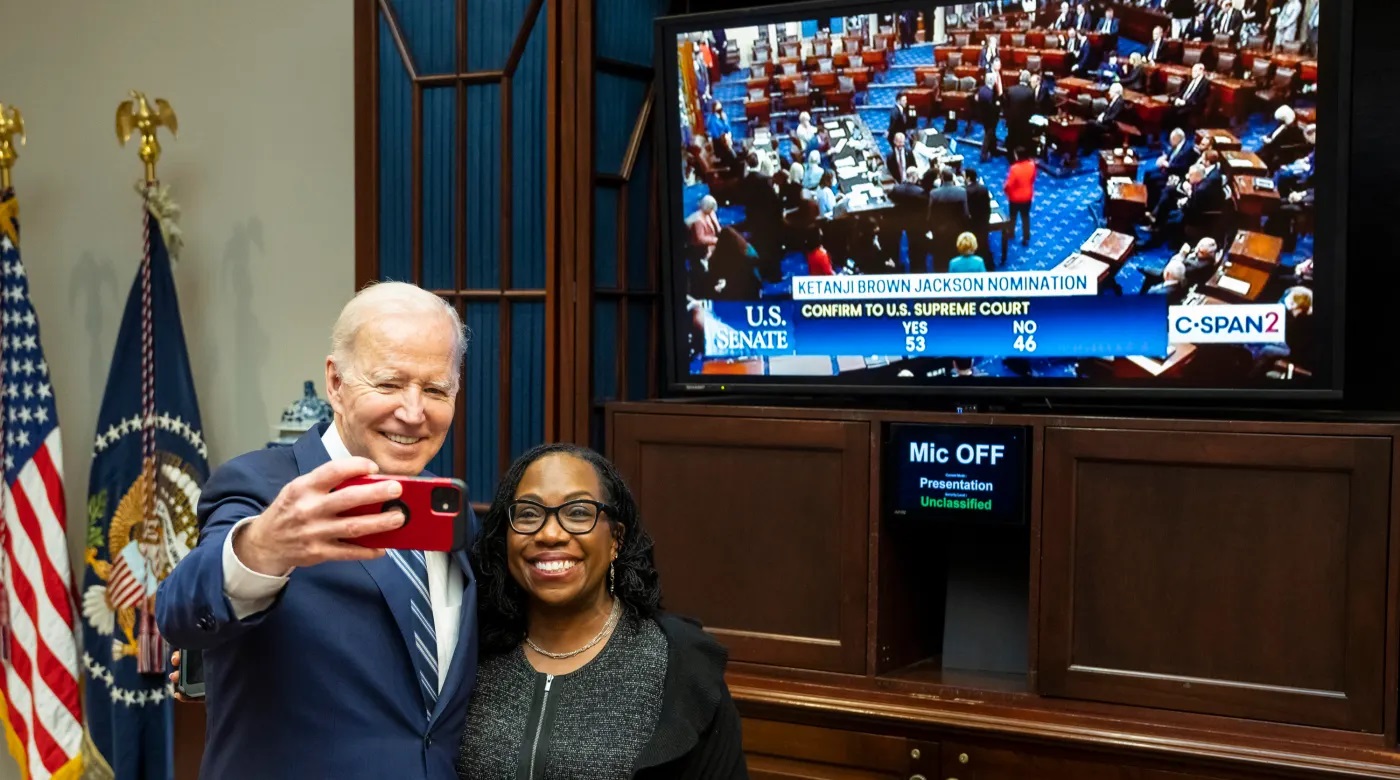JUDGE KETANJI BROWN JACKSON BECOMES AMERICA’S FIRST BLACK ASSOCIATE SUPREME COURT JUSTICE AMID AN UNDERTOW OF RACIAL GERRYMANDERED ELECTORAL DISTRICTS
Only three Republicans voted to confirm Judge Ketanji Brown Jackson as the next Associate Justice of the U.S. Supreme Court. Last Thursday, Susan Collins of Maine, Lisa Murkowski of Alaska, and Mitt Romney of Utah voted for Jackson. The lone black senator Tim Scott voted “no.”
Despite endorsements from former law clerks, the International Association of Chiefs of Police, Judge Thomas R. Griffith, a retired Bush appointee to the Court of Appeals for the D.C. Circuit, and other conservative Republican judges, most Republican senators voted not to confirm Jackson. Then they walked off the Senate floor after voting.
At Jackson’s confirmation hearings, Republican members on the Senate Judiciary Committee put on a show. The attacks on Jackson by Senator Josh Hawley, Ted Cruz, and others were political theatre and not in a good way. They implied that Jackson was soft on crime. They painted her as a radical activist judge who couldn’t be trusted. Some, like Lindsay Graham, used their time to exact revenge for the way Democrats voted against Republican nominees.
Republicans questioned Jackson’s judgments, her judicial philosophy (which she didn’t share with the committee), and asked her stupid questions like “What is a woman?”
They attacked the judge with a fervor not seen from Republicans since the confirmation hearings of Amy Coney Barrett, Brett Kavanaugh, and Neil Gorsuch, all Trump nominees to the High Court.
Republicans’ partisan defense of Trump’s picks was as disingenuous as their attacks on Jackson. They confirmed Trump’s nominees despite credible concerns about Barrett’s pro-life activism, sexual abuse accusations against Kavanaugh, and Sen. Mitch McConnell’s theft of President Barack Obama’s Supreme Court nomination. Gorsuch is in that seat.

Confirming Jackson to the SCOTUS won’t change the Republican’s 6-3 vote advantage. But the first black woman, Associate Justice, will write opinions that assess whether the majority’s rulings are fair or unfair.
However, the most disgraceful no votes, relative to Louisiana, came from Republican Senators Bill Cassidy and John N. Kennedy. Their pseudo-intellectual excuses for voting no on Jackson and everything else Biden proposes is the best reason for abolishing partisan and racial gerrymandering, full stop. They are the poster boys for why gerrymandered districts amount to taxation without representation for black Louisianans.
“She (Jackson) is gracious, intelligent and accomplished. But when the political left opposed Gorsuch, Kavanaugh and Coney Barrett, not because they were not qualified but because of their presumed jurisprudence, they established the criteria by which future nominees should be judged,” The Daily Advertiser reported.

“President Biden chose Judge Jackson precisely because she is not a strict constructionist and because she had the strong support of those who prefer an activist judge. It is for these reasons that I will vote no,” Cassidy concluded.
“I found Judge Jackson to be smart, well versed in the law and extraordinarily artful in her ability to speak at length without saying anything of substance on critical questions, especially the limits of judicial power and the importance of judicial restraint,” Kennedy said.
So, Cassidy judged Jackson as someone opposed to “strict constructionism” (where did he get that idea?). Kennedy’s ‘critical questions’ were about Jackson’s opinions on expanding the Court and states’ rights. Because Jackson declined to offer her personal viewpoints (as did Amy Coney-Barrett), Kennedy inferred that she was shallow. Neither excuse is logical.
Kennedy voted against certifying Biden’s electoral win. When Biden vowed to put a black woman on the Supreme Court, Kennedy said a nominee should “know a law book from a J-Crew catalog.” Kennedy’s “catalog” comment suggested that black female jurists don’t know the law.
Judge Jackson is a more qualified jurist than many on the Court now. Kennedy’s comment illustrates the need for an end to partisan and racial gerrymandering. Gerrymandering is the mechanism that keeps him in office. And it gives him the ability to preserve white supremacy and white privilege to the detriment of the state’s black citizens. Racial and partisan gerrymandering is un-American and needs to end.
In Louisiana, Republicans dominate the state legislature. This year they passed the same partisan and racially gerrymandered maps they’ve passed for the last 20 years. They were so desperate to keep the status quo, Republicans in the state legislature overrode Governor John Bel Edwards veto of their rigged maps.

That white dominance is the goal. This is evident in the lopsided majorities in Louisiana’s legislature and congressional delegation.
Kennedy and Cassidy and five of the six Congressmen from Louisiana are white. Congressman Troy Carter is the only Democrat and black person in the state’s Congressional delegation.
There never has been a black senator from Louisiana. Acting Governor P.B.S. Pinchback was nominated to the U.S. Senate in 1873. But he never even got to Washington. If white state legislators have their way, there never will be.
Whites comprise 58 percent of the Louisiana population, blacks comprise 33 percent, and the rest are people of color. So how do whites hold 75 percent of the state’s House seats, 74 percent of state senate seats, 100 percent of the U.S. Senate seats, and 83 percent of the U.S. House seats?
Partisan and racial gerrymandered districts pack blacks into an electoral district or crack (divide) the black population into predominately white sections. Both tactics dilute the black vote and prevent blacks from electing candidates with shared experiences and culture.
By voting not to confirm Jackson, did Kennedy and Cassidy just ignored the will of one-third of Louisiana’s population and assumed that every white Louisianan doesn’t want a black woman on the Supreme Court?
Senators Collins, Murkowski, and Romney deserve credit for stepping outside of the white supremacy bubble in Congress. Like President Biden, they know a person should be judged by the content of their character, not the color of their skin.
“I’m pleased to nominate Judge Jackson, who’ll bring extraordinary qualifications, deep experience and intellect, and a rigorous judicial record to the court,” ”President Biden said during a public announcement.
Related: Veto is About Race
After Jackson’s confirmation, Vice-President Kamala Harris, America’s first black woman vice-president, told the judge, “The young leaders of our nation will learn from the experience, the judgment, the wisdom that you, Judge Jackson, will apply in every case that comes before you. And they will see, for the first time, four women sitting on that Court at one time.”
Standing on the south lawn of the White House, Jackson thanked a litany of family members, her family, husband, and daughters, supporters, congresspeople, and Harvard classmates with whom she formed a lifelong bond. At Harvard College, “I met my indefatigable and beloved roommates, Lisa Fairfax, Nina Coleman Simmons, and Antoinette Sequeira Coakley — they are truly my sisters,” she said.
Kimberly Robinson, a University of Virginia law professor, was Jackson’s Harvard Law School roommate. Robinson said that Jackson will be a justice for all seasons, for all people. “She’s brilliant and humble, open, honest, and she has the determination and perseverance to succeed at anything she does.”
Last Friday, MSNBC “Last Word” host Lawrence O’Donnell spoke with Judge Jackson’s friends. Two are law professors and the other is an attorney. CBS News also interviewed the women who credited Jackson with encouraging the group to persevere and succeed.
History is made in America
With the Senate 53-47 vote on Thursday, April 7, 2022, Judge Ketanji Brown Jackson stepped into American history as the first black woman Associate Justice to sit on the U.S. Supreme Court.
“It has taken 232 years and 115 prior appointments for a Black woman to be selected to serve on the Supreme Court of the United States. But we’ve made it. We’ve made it, all of us. All of us. And — and our children are telling me that they see now, more than ever, that, here in America, anything is possible,” Jackson said.
I am also ever buoyed by the leadership of generations past who helped to light the way: Dr. Martin Luther King Jr., Justice Thurgood Marshall, and my personal heroine, Judge Constance Baker Motley, I think of them as the true pathbreakers. I am just the very lucky first inheritor of the dream of liberty and justice for all. The path was cleared for me so that I might rise to this occasion.
“I have dedicated my career to public service because I love this country and our Constitution and the rights that make us free. I’ve also spent the better part of the past decade hearing thousands of cases and writing hundreds of opinions.
And in the poetic words of Dr. Maya Angelou, I do so now, while “bringing the gifts…my ancestors gave.” I –“I am the dream and the hope of the slave,” Jackson concluded.
Meanwhile, the struggle for voting rights continues in Louisiana and across the nation. It’s possible that when Jackson joins the Court, the newest Associate Justice may have to decide redistricting cases.
Two lawsuits in the Federal Court in Louisiana are asking the Federal Court in Baton Rouge for the state’ maps to include additional congressional state legislature seats.
State Senator John Neely Kennedy is running for re-election. News reports say he is leading in the polls. If he wins six more years on Capitol Hill, one can only guess what type of representation blacks will have in the U.S. Senate.
Black voters must educate themselves about the candidates running for elective office because all skin folk is not kinfolk. Rumors are circulating that a certain black democratic senate hopeful is a Republican tool, a spoiler. Stay woke.

